Trends in the Global Business Environment: Employee Retention Report
VerifiedAdded on 2023/01/24
|7
|1964
|29
Report
AI Summary
This report examines the critical topic of employee retention within the context of the global business environment, with a specific focus on remote workers. The report begins by defining employee retention and highlighting its significance in maintaining skilled workforces and achieving competitive advantages. It addresses key questions derived from a core article, including the importance of employee retention, the factors affecting remote workers' behavior, the role of management in bridging the gap between traditional and remote employees, and methods for fostering inclusion to facilitate employee retention. The report synthesizes findings from the core article and connects it with other relevant literature, exploring issues such as employee engagement, isolation, and the impact of management styles. It emphasizes the need for strategic initiatives like virtual meetings, structured communication, and innovative team-building activities to enhance remote worker's sense of belonging. The analysis covers the role of human resource management, the impact of work-life balance, the importance of trust and management style, and the effects of a supportive work environment on employee retention. The report concludes by summarizing the key insights and reiterating the crucial role of effective management and HR practices in fostering employee retention and organizational success.
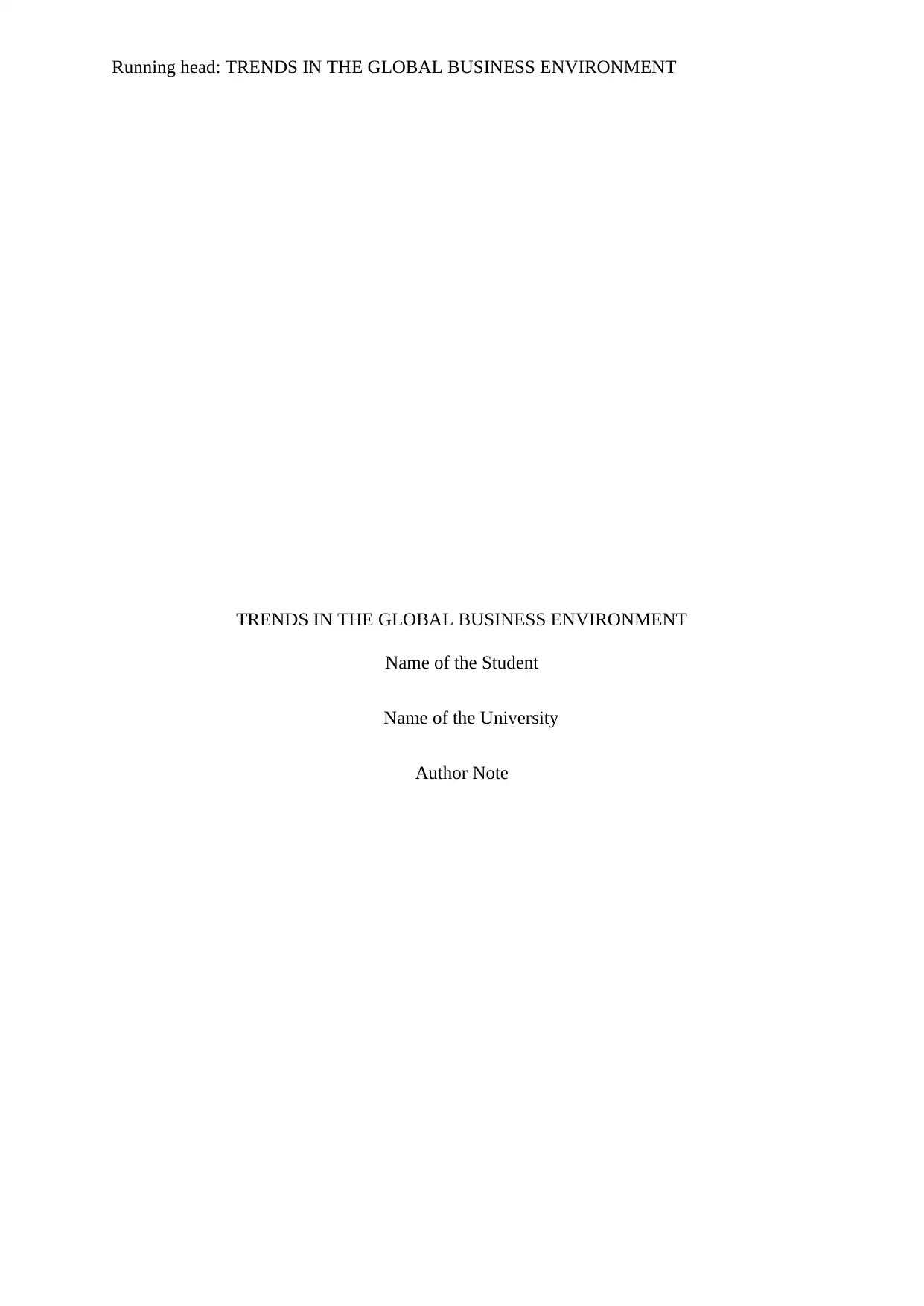
Running head: TRENDS IN THE GLOBAL BUSINESS ENVIRONMENT
TRENDS IN THE GLOBAL BUSINESS ENVIRONMENT
Name of the Student
Name of the University
Author Note
TRENDS IN THE GLOBAL BUSINESS ENVIRONMENT
Name of the Student
Name of the University
Author Note
Paraphrase This Document
Need a fresh take? Get an instant paraphrase of this document with our AI Paraphraser
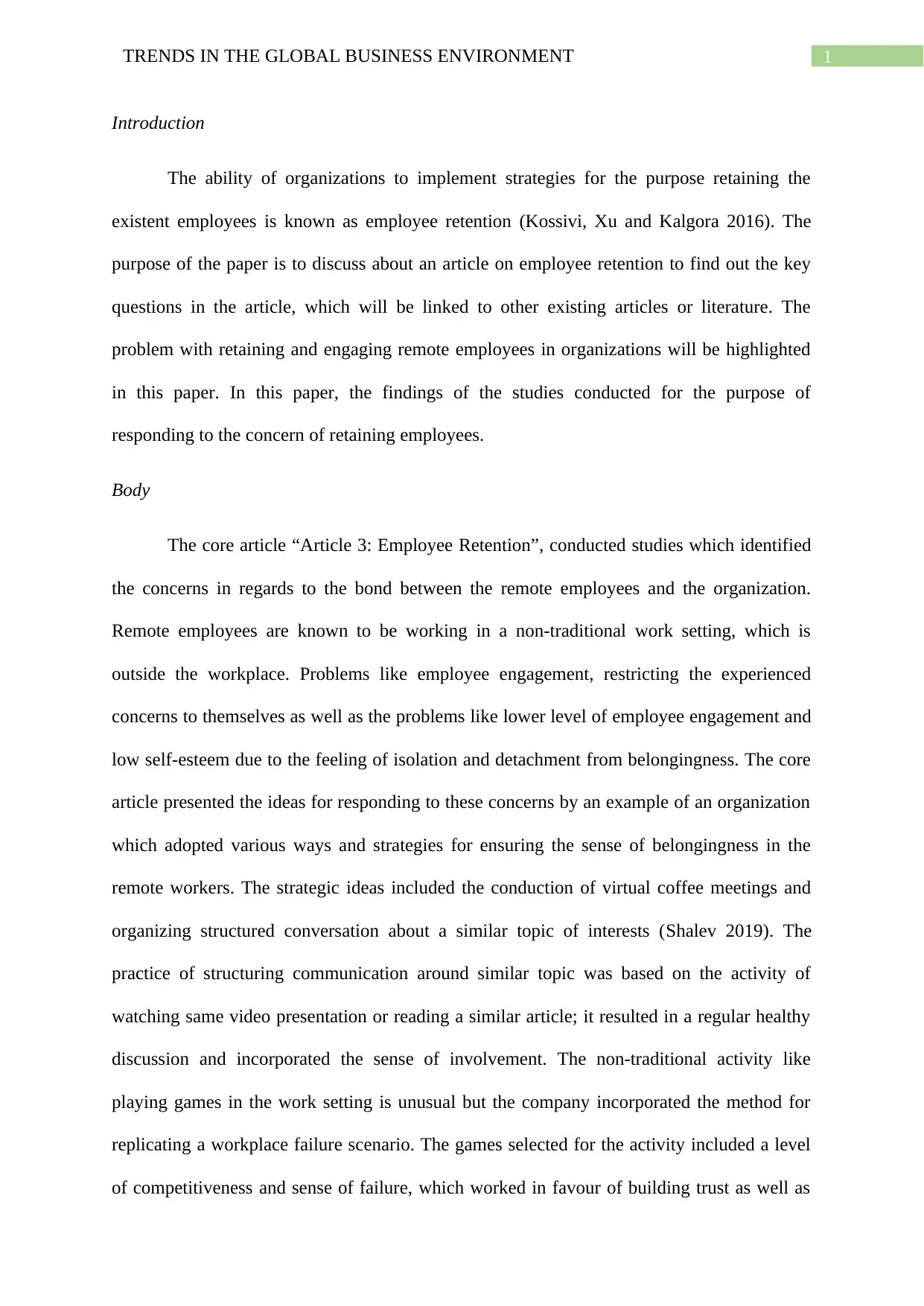
1TRENDS IN THE GLOBAL BUSINESS ENVIRONMENT
Introduction
The ability of organizations to implement strategies for the purpose retaining the
existent employees is known as employee retention (Kossivi, Xu and Kalgora 2016). The
purpose of the paper is to discuss about an article on employee retention to find out the key
questions in the article, which will be linked to other existing articles or literature. The
problem with retaining and engaging remote employees in organizations will be highlighted
in this paper. In this paper, the findings of the studies conducted for the purpose of
responding to the concern of retaining employees.
Body
The core article “Article 3: Employee Retention”, conducted studies which identified
the concerns in regards to the bond between the remote employees and the organization.
Remote employees are known to be working in a non-traditional work setting, which is
outside the workplace. Problems like employee engagement, restricting the experienced
concerns to themselves as well as the problems like lower level of employee engagement and
low self-esteem due to the feeling of isolation and detachment from belongingness. The core
article presented the ideas for responding to these concerns by an example of an organization
which adopted various ways and strategies for ensuring the sense of belongingness in the
remote workers. The strategic ideas included the conduction of virtual coffee meetings and
organizing structured conversation about a similar topic of interests (Shalev 2019). The
practice of structuring communication around similar topic was based on the activity of
watching same video presentation or reading a similar article; it resulted in a regular healthy
discussion and incorporated the sense of involvement. The non-traditional activity like
playing games in the work setting is unusual but the company incorporated the method for
replicating a workplace failure scenario. The games selected for the activity included a level
of competitiveness and sense of failure, which worked in favour of building trust as well as
Introduction
The ability of organizations to implement strategies for the purpose retaining the
existent employees is known as employee retention (Kossivi, Xu and Kalgora 2016). The
purpose of the paper is to discuss about an article on employee retention to find out the key
questions in the article, which will be linked to other existing articles or literature. The
problem with retaining and engaging remote employees in organizations will be highlighted
in this paper. In this paper, the findings of the studies conducted for the purpose of
responding to the concern of retaining employees.
Body
The core article “Article 3: Employee Retention”, conducted studies which identified
the concerns in regards to the bond between the remote employees and the organization.
Remote employees are known to be working in a non-traditional work setting, which is
outside the workplace. Problems like employee engagement, restricting the experienced
concerns to themselves as well as the problems like lower level of employee engagement and
low self-esteem due to the feeling of isolation and detachment from belongingness. The core
article presented the ideas for responding to these concerns by an example of an organization
which adopted various ways and strategies for ensuring the sense of belongingness in the
remote workers. The strategic ideas included the conduction of virtual coffee meetings and
organizing structured conversation about a similar topic of interests (Shalev 2019). The
practice of structuring communication around similar topic was based on the activity of
watching same video presentation or reading a similar article; it resulted in a regular healthy
discussion and incorporated the sense of involvement. The non-traditional activity like
playing games in the work setting is unusual but the company incorporated the method for
replicating a workplace failure scenario. The games selected for the activity included a level
of competitiveness and sense of failure, which worked in favour of building trust as well as
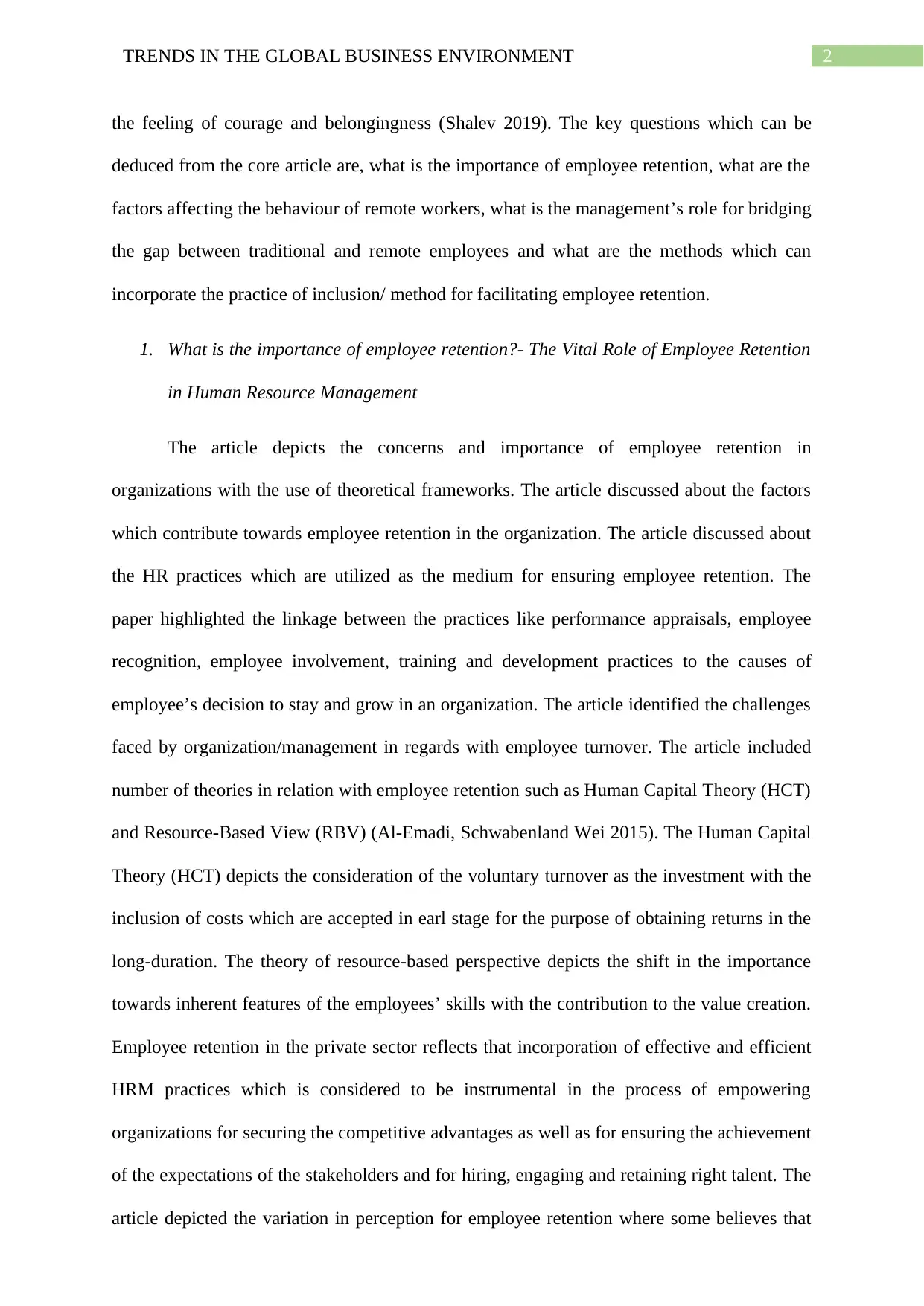
2TRENDS IN THE GLOBAL BUSINESS ENVIRONMENT
the feeling of courage and belongingness (Shalev 2019). The key questions which can be
deduced from the core article are, what is the importance of employee retention, what are the
factors affecting the behaviour of remote workers, what is the management’s role for bridging
the gap between traditional and remote employees and what are the methods which can
incorporate the practice of inclusion/ method for facilitating employee retention.
1. What is the importance of employee retention?- The Vital Role of Employee Retention
in Human Resource Management
The article depicts the concerns and importance of employee retention in
organizations with the use of theoretical frameworks. The article discussed about the factors
which contribute towards employee retention in the organization. The article discussed about
the HR practices which are utilized as the medium for ensuring employee retention. The
paper highlighted the linkage between the practices like performance appraisals, employee
recognition, employee involvement, training and development practices to the causes of
employee’s decision to stay and grow in an organization. The article identified the challenges
faced by organization/management in regards with employee turnover. The article included
number of theories in relation with employee retention such as Human Capital Theory (HCT)
and Resource-Based View (RBV) (Al-Emadi, Schwabenland Wei 2015). The Human Capital
Theory (HCT) depicts the consideration of the voluntary turnover as the investment with the
inclusion of costs which are accepted in earl stage for the purpose of obtaining returns in the
long-duration. The theory of resource-based perspective depicts the shift in the importance
towards inherent features of the employees’ skills with the contribution to the value creation.
Employee retention in the private sector reflects that incorporation of effective and efficient
HRM practices which is considered to be instrumental in the process of empowering
organizations for securing the competitive advantages as well as for ensuring the achievement
of the expectations of the stakeholders and for hiring, engaging and retaining right talent. The
article depicted the variation in perception for employee retention where some believes that
the feeling of courage and belongingness (Shalev 2019). The key questions which can be
deduced from the core article are, what is the importance of employee retention, what are the
factors affecting the behaviour of remote workers, what is the management’s role for bridging
the gap between traditional and remote employees and what are the methods which can
incorporate the practice of inclusion/ method for facilitating employee retention.
1. What is the importance of employee retention?- The Vital Role of Employee Retention
in Human Resource Management
The article depicts the concerns and importance of employee retention in
organizations with the use of theoretical frameworks. The article discussed about the factors
which contribute towards employee retention in the organization. The article discussed about
the HR practices which are utilized as the medium for ensuring employee retention. The
paper highlighted the linkage between the practices like performance appraisals, employee
recognition, employee involvement, training and development practices to the causes of
employee’s decision to stay and grow in an organization. The article identified the challenges
faced by organization/management in regards with employee turnover. The article included
number of theories in relation with employee retention such as Human Capital Theory (HCT)
and Resource-Based View (RBV) (Al-Emadi, Schwabenland Wei 2015). The Human Capital
Theory (HCT) depicts the consideration of the voluntary turnover as the investment with the
inclusion of costs which are accepted in earl stage for the purpose of obtaining returns in the
long-duration. The theory of resource-based perspective depicts the shift in the importance
towards inherent features of the employees’ skills with the contribution to the value creation.
Employee retention in the private sector reflects that incorporation of effective and efficient
HRM practices which is considered to be instrumental in the process of empowering
organizations for securing the competitive advantages as well as for ensuring the achievement
of the expectations of the stakeholders and for hiring, engaging and retaining right talent. The
article depicted the variation in perception for employee retention where some believes that
⊘ This is a preview!⊘
Do you want full access?
Subscribe today to unlock all pages.

Trusted by 1+ million students worldwide
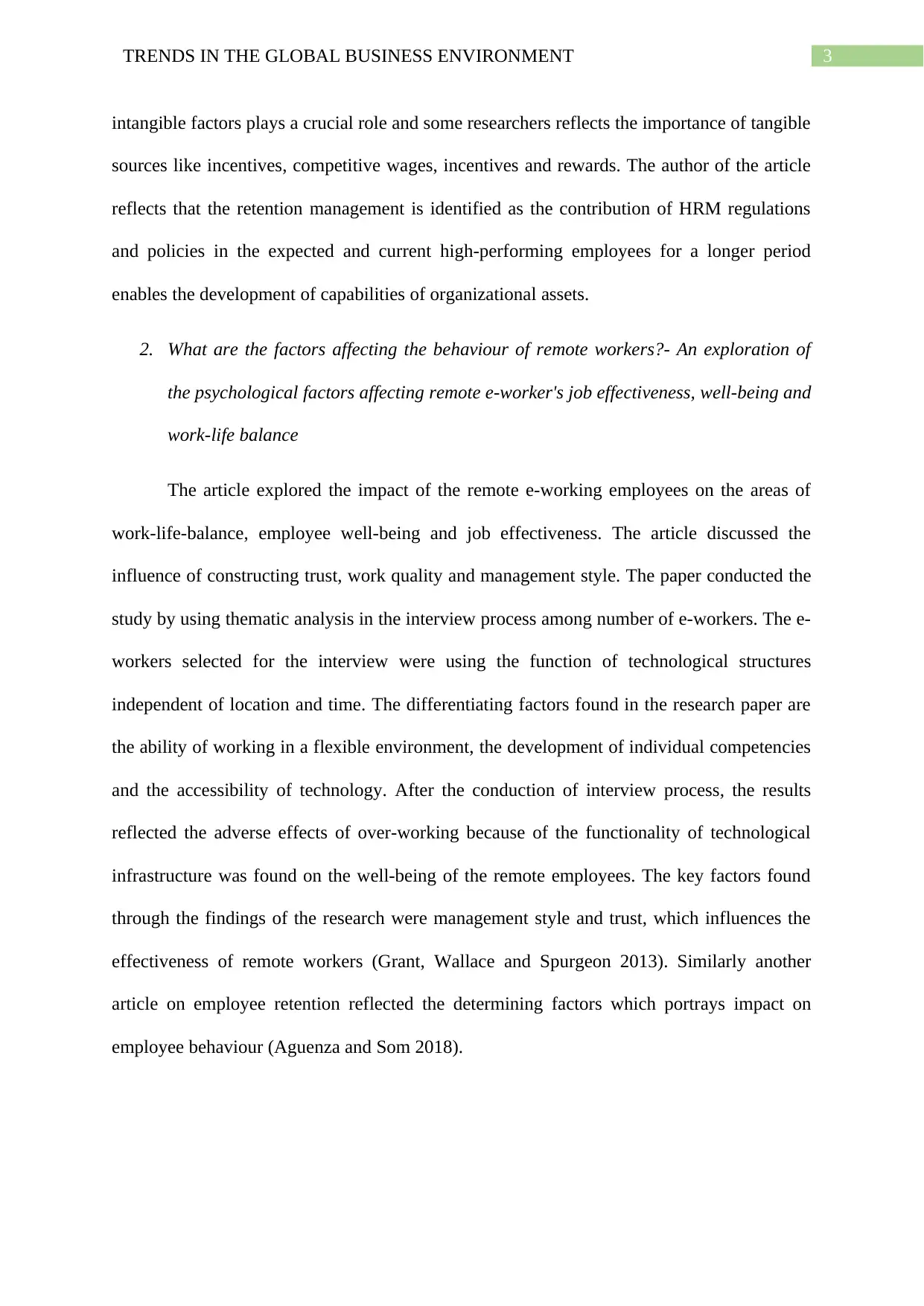
3TRENDS IN THE GLOBAL BUSINESS ENVIRONMENT
intangible factors plays a crucial role and some researchers reflects the importance of tangible
sources like incentives, competitive wages, incentives and rewards. The author of the article
reflects that the retention management is identified as the contribution of HRM regulations
and policies in the expected and current high-performing employees for a longer period
enables the development of capabilities of organizational assets.
2. What are the factors affecting the behaviour of remote workers?- An exploration of
the psychological factors affecting remote e-worker's job effectiveness, well-being and
work-life balance
The article explored the impact of the remote e-working employees on the areas of
work-life-balance, employee well-being and job effectiveness. The article discussed the
influence of constructing trust, work quality and management style. The paper conducted the
study by using thematic analysis in the interview process among number of e-workers. The e-
workers selected for the interview were using the function of technological structures
independent of location and time. The differentiating factors found in the research paper are
the ability of working in a flexible environment, the development of individual competencies
and the accessibility of technology. After the conduction of interview process, the results
reflected the adverse effects of over-working because of the functionality of technological
infrastructure was found on the well-being of the remote employees. The key factors found
through the findings of the research were management style and trust, which influences the
effectiveness of remote workers (Grant, Wallace and Spurgeon 2013). Similarly another
article on employee retention reflected the determining factors which portrays impact on
employee behaviour (Aguenza and Som 2018).
intangible factors plays a crucial role and some researchers reflects the importance of tangible
sources like incentives, competitive wages, incentives and rewards. The author of the article
reflects that the retention management is identified as the contribution of HRM regulations
and policies in the expected and current high-performing employees for a longer period
enables the development of capabilities of organizational assets.
2. What are the factors affecting the behaviour of remote workers?- An exploration of
the psychological factors affecting remote e-worker's job effectiveness, well-being and
work-life balance
The article explored the impact of the remote e-working employees on the areas of
work-life-balance, employee well-being and job effectiveness. The article discussed the
influence of constructing trust, work quality and management style. The paper conducted the
study by using thematic analysis in the interview process among number of e-workers. The e-
workers selected for the interview were using the function of technological structures
independent of location and time. The differentiating factors found in the research paper are
the ability of working in a flexible environment, the development of individual competencies
and the accessibility of technology. After the conduction of interview process, the results
reflected the adverse effects of over-working because of the functionality of technological
infrastructure was found on the well-being of the remote employees. The key factors found
through the findings of the research were management style and trust, which influences the
effectiveness of remote workers (Grant, Wallace and Spurgeon 2013). Similarly another
article on employee retention reflected the determining factors which portrays impact on
employee behaviour (Aguenza and Som 2018).
Paraphrase This Document
Need a fresh take? Get an instant paraphrase of this document with our AI Paraphraser
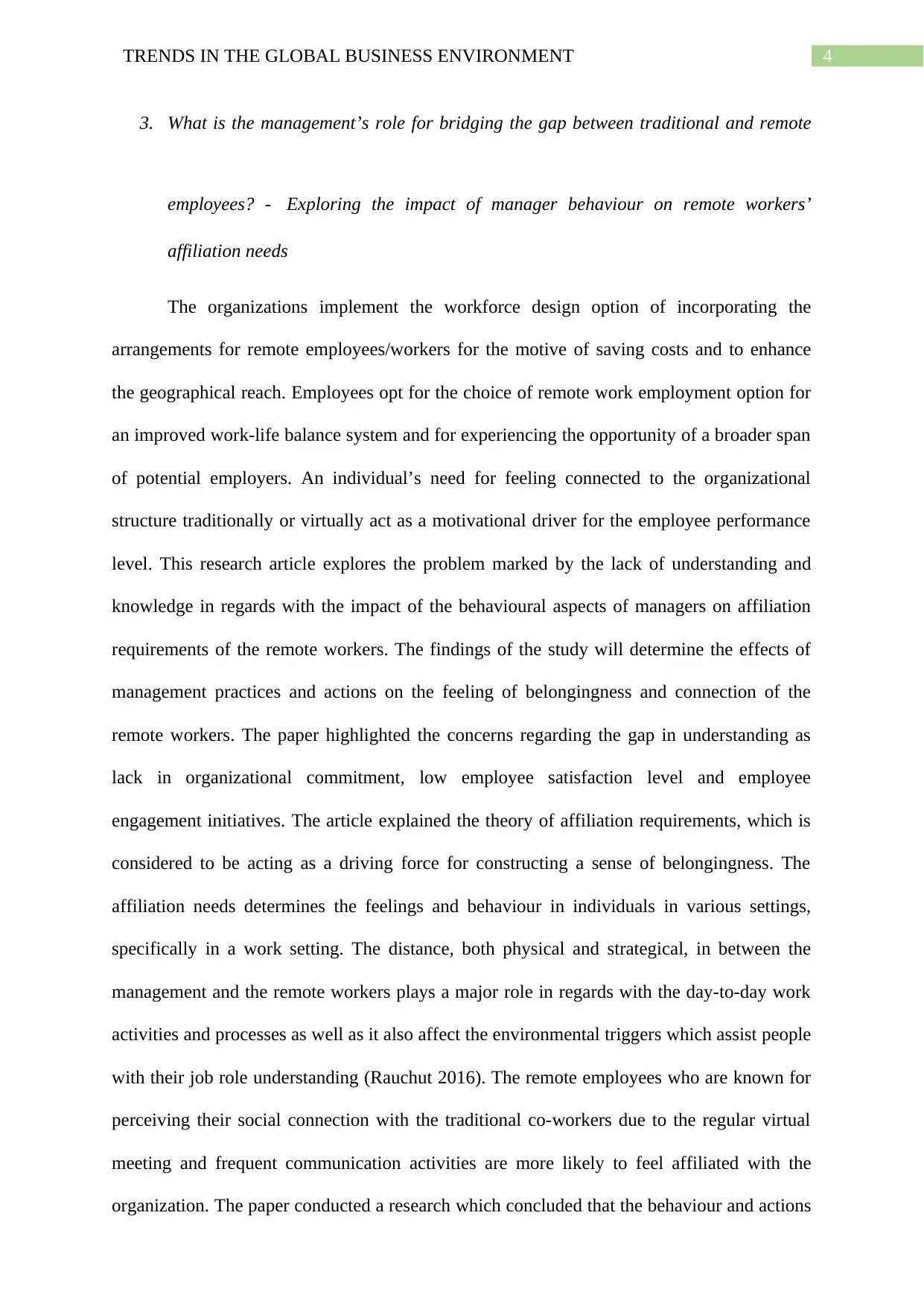
4TRENDS IN THE GLOBAL BUSINESS ENVIRONMENT
3. What is the management’s role for bridging the gap between traditional and remote
employees? - Exploring the impact of manager behaviour on remote workers’
affiliation needs
The organizations implement the workforce design option of incorporating the
arrangements for remote employees/workers for the motive of saving costs and to enhance
the geographical reach. Employees opt for the choice of remote work employment option for
an improved work-life balance system and for experiencing the opportunity of a broader span
of potential employers. An individual’s need for feeling connected to the organizational
structure traditionally or virtually act as a motivational driver for the employee performance
level. This research article explores the problem marked by the lack of understanding and
knowledge in regards with the impact of the behavioural aspects of managers on affiliation
requirements of the remote workers. The findings of the study will determine the effects of
management practices and actions on the feeling of belongingness and connection of the
remote workers. The paper highlighted the concerns regarding the gap in understanding as
lack in organizational commitment, low employee satisfaction level and employee
engagement initiatives. The article explained the theory of affiliation requirements, which is
considered to be acting as a driving force for constructing a sense of belongingness. The
affiliation needs determines the feelings and behaviour in individuals in various settings,
specifically in a work setting. The distance, both physical and strategical, in between the
management and the remote workers plays a major role in regards with the day-to-day work
activities and processes as well as it also affect the environmental triggers which assist people
with their job role understanding (Rauchut 2016). The remote employees who are known for
perceiving their social connection with the traditional co-workers due to the regular virtual
meeting and frequent communication activities are more likely to feel affiliated with the
organization. The paper conducted a research which concluded that the behaviour and actions
3. What is the management’s role for bridging the gap between traditional and remote
employees? - Exploring the impact of manager behaviour on remote workers’
affiliation needs
The organizations implement the workforce design option of incorporating the
arrangements for remote employees/workers for the motive of saving costs and to enhance
the geographical reach. Employees opt for the choice of remote work employment option for
an improved work-life balance system and for experiencing the opportunity of a broader span
of potential employers. An individual’s need for feeling connected to the organizational
structure traditionally or virtually act as a motivational driver for the employee performance
level. This research article explores the problem marked by the lack of understanding and
knowledge in regards with the impact of the behavioural aspects of managers on affiliation
requirements of the remote workers. The findings of the study will determine the effects of
management practices and actions on the feeling of belongingness and connection of the
remote workers. The paper highlighted the concerns regarding the gap in understanding as
lack in organizational commitment, low employee satisfaction level and employee
engagement initiatives. The article explained the theory of affiliation requirements, which is
considered to be acting as a driving force for constructing a sense of belongingness. The
affiliation needs determines the feelings and behaviour in individuals in various settings,
specifically in a work setting. The distance, both physical and strategical, in between the
management and the remote workers plays a major role in regards with the day-to-day work
activities and processes as well as it also affect the environmental triggers which assist people
with their job role understanding (Rauchut 2016). The remote employees who are known for
perceiving their social connection with the traditional co-workers due to the regular virtual
meeting and frequent communication activities are more likely to feel affiliated with the
organization. The paper conducted a research which concluded that the behaviour and actions
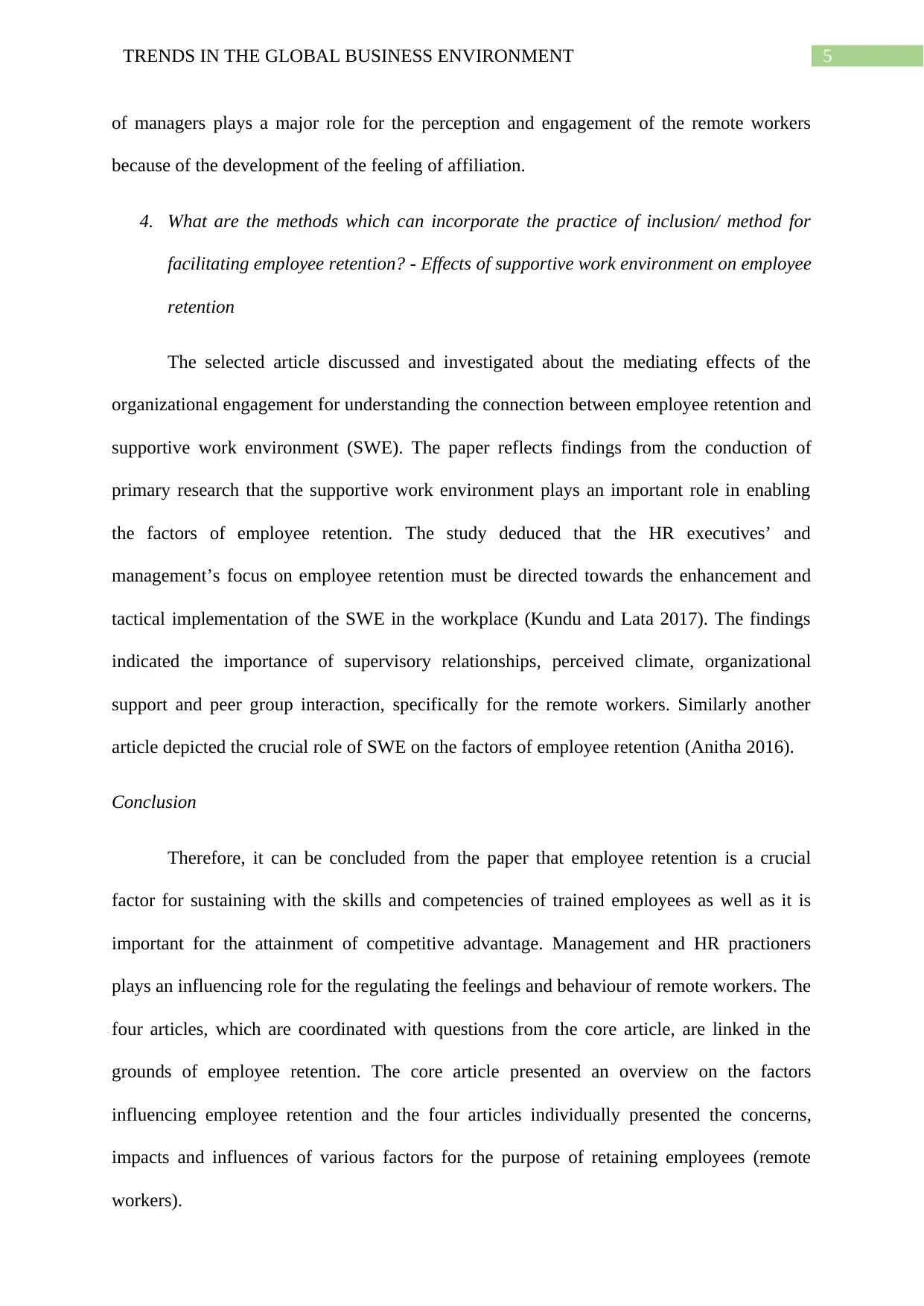
5TRENDS IN THE GLOBAL BUSINESS ENVIRONMENT
of managers plays a major role for the perception and engagement of the remote workers
because of the development of the feeling of affiliation.
4. What are the methods which can incorporate the practice of inclusion/ method for
facilitating employee retention? - Effects of supportive work environment on employee
retention
The selected article discussed and investigated about the mediating effects of the
organizational engagement for understanding the connection between employee retention and
supportive work environment (SWE). The paper reflects findings from the conduction of
primary research that the supportive work environment plays an important role in enabling
the factors of employee retention. The study deduced that the HR executives’ and
management’s focus on employee retention must be directed towards the enhancement and
tactical implementation of the SWE in the workplace (Kundu and Lata 2017). The findings
indicated the importance of supervisory relationships, perceived climate, organizational
support and peer group interaction, specifically for the remote workers. Similarly another
article depicted the crucial role of SWE on the factors of employee retention (Anitha 2016).
Conclusion
Therefore, it can be concluded from the paper that employee retention is a crucial
factor for sustaining with the skills and competencies of trained employees as well as it is
important for the attainment of competitive advantage. Management and HR practioners
plays an influencing role for the regulating the feelings and behaviour of remote workers. The
four articles, which are coordinated with questions from the core article, are linked in the
grounds of employee retention. The core article presented an overview on the factors
influencing employee retention and the four articles individually presented the concerns,
impacts and influences of various factors for the purpose of retaining employees (remote
workers).
of managers plays a major role for the perception and engagement of the remote workers
because of the development of the feeling of affiliation.
4. What are the methods which can incorporate the practice of inclusion/ method for
facilitating employee retention? - Effects of supportive work environment on employee
retention
The selected article discussed and investigated about the mediating effects of the
organizational engagement for understanding the connection between employee retention and
supportive work environment (SWE). The paper reflects findings from the conduction of
primary research that the supportive work environment plays an important role in enabling
the factors of employee retention. The study deduced that the HR executives’ and
management’s focus on employee retention must be directed towards the enhancement and
tactical implementation of the SWE in the workplace (Kundu and Lata 2017). The findings
indicated the importance of supervisory relationships, perceived climate, organizational
support and peer group interaction, specifically for the remote workers. Similarly another
article depicted the crucial role of SWE on the factors of employee retention (Anitha 2016).
Conclusion
Therefore, it can be concluded from the paper that employee retention is a crucial
factor for sustaining with the skills and competencies of trained employees as well as it is
important for the attainment of competitive advantage. Management and HR practioners
plays an influencing role for the regulating the feelings and behaviour of remote workers. The
four articles, which are coordinated with questions from the core article, are linked in the
grounds of employee retention. The core article presented an overview on the factors
influencing employee retention and the four articles individually presented the concerns,
impacts and influences of various factors for the purpose of retaining employees (remote
workers).
⊘ This is a preview!⊘
Do you want full access?
Subscribe today to unlock all pages.

Trusted by 1+ million students worldwide
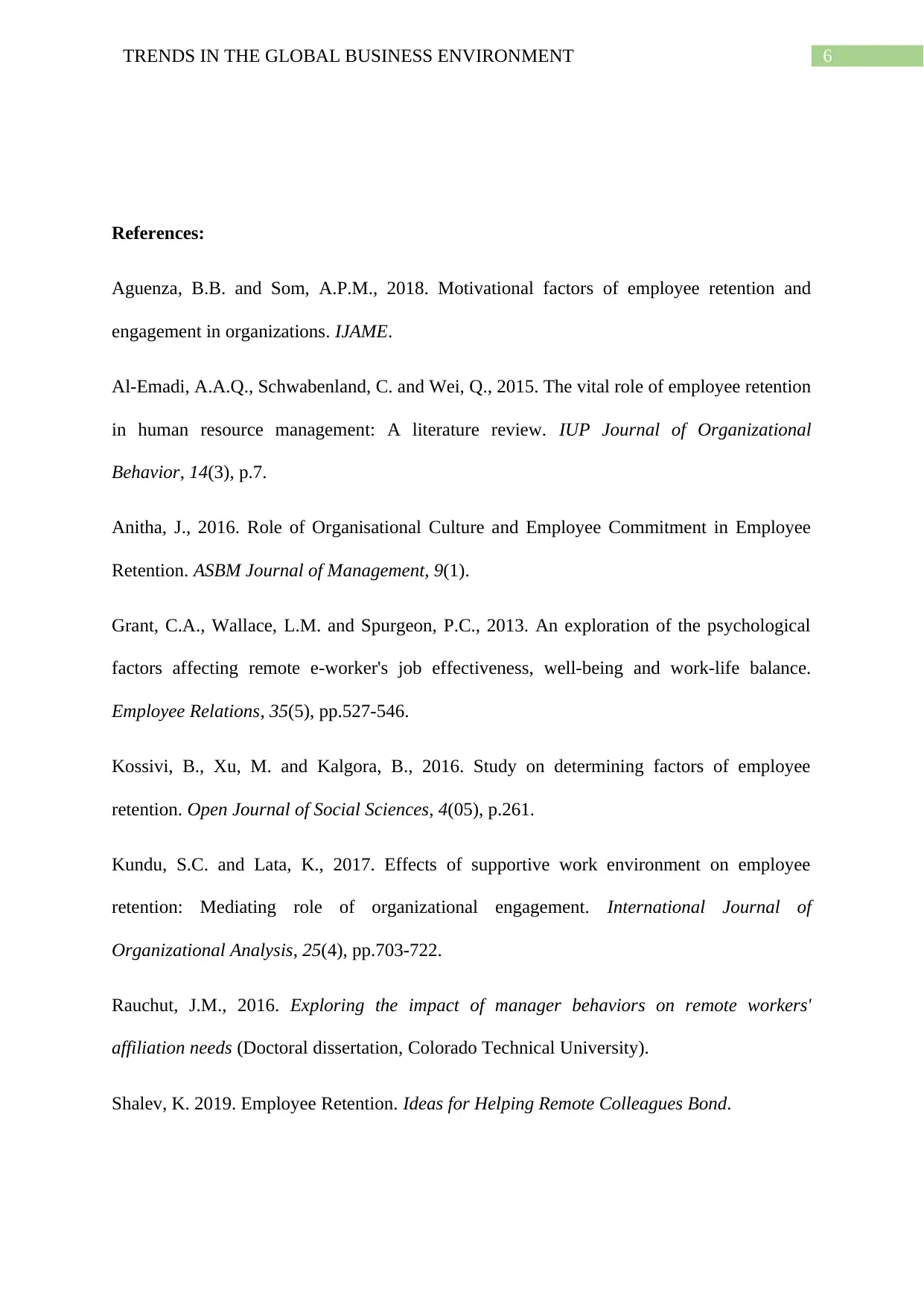
6TRENDS IN THE GLOBAL BUSINESS ENVIRONMENT
References:
Aguenza, B.B. and Som, A.P.M., 2018. Motivational factors of employee retention and
engagement in organizations. IJAME.
Al-Emadi, A.A.Q., Schwabenland, C. and Wei, Q., 2015. The vital role of employee retention
in human resource management: A literature review. IUP Journal of Organizational
Behavior, 14(3), p.7.
Anitha, J., 2016. Role of Organisational Culture and Employee Commitment in Employee
Retention. ASBM Journal of Management, 9(1).
Grant, C.A., Wallace, L.M. and Spurgeon, P.C., 2013. An exploration of the psychological
factors affecting remote e-worker's job effectiveness, well-being and work-life balance.
Employee Relations, 35(5), pp.527-546.
Kossivi, B., Xu, M. and Kalgora, B., 2016. Study on determining factors of employee
retention. Open Journal of Social Sciences, 4(05), p.261.
Kundu, S.C. and Lata, K., 2017. Effects of supportive work environment on employee
retention: Mediating role of organizational engagement. International Journal of
Organizational Analysis, 25(4), pp.703-722.
Rauchut, J.M., 2016. Exploring the impact of manager behaviors on remote workers'
affiliation needs (Doctoral dissertation, Colorado Technical University).
Shalev, K. 2019. Employee Retention. Ideas for Helping Remote Colleagues Bond.
References:
Aguenza, B.B. and Som, A.P.M., 2018. Motivational factors of employee retention and
engagement in organizations. IJAME.
Al-Emadi, A.A.Q., Schwabenland, C. and Wei, Q., 2015. The vital role of employee retention
in human resource management: A literature review. IUP Journal of Organizational
Behavior, 14(3), p.7.
Anitha, J., 2016. Role of Organisational Culture and Employee Commitment in Employee
Retention. ASBM Journal of Management, 9(1).
Grant, C.A., Wallace, L.M. and Spurgeon, P.C., 2013. An exploration of the psychological
factors affecting remote e-worker's job effectiveness, well-being and work-life balance.
Employee Relations, 35(5), pp.527-546.
Kossivi, B., Xu, M. and Kalgora, B., 2016. Study on determining factors of employee
retention. Open Journal of Social Sciences, 4(05), p.261.
Kundu, S.C. and Lata, K., 2017. Effects of supportive work environment on employee
retention: Mediating role of organizational engagement. International Journal of
Organizational Analysis, 25(4), pp.703-722.
Rauchut, J.M., 2016. Exploring the impact of manager behaviors on remote workers'
affiliation needs (Doctoral dissertation, Colorado Technical University).
Shalev, K. 2019. Employee Retention. Ideas for Helping Remote Colleagues Bond.
1 out of 7
Related Documents
Your All-in-One AI-Powered Toolkit for Academic Success.
+13062052269
info@desklib.com
Available 24*7 on WhatsApp / Email
![[object Object]](/_next/static/media/star-bottom.7253800d.svg)
Unlock your academic potential
Copyright © 2020–2025 A2Z Services. All Rights Reserved. Developed and managed by ZUCOL.





